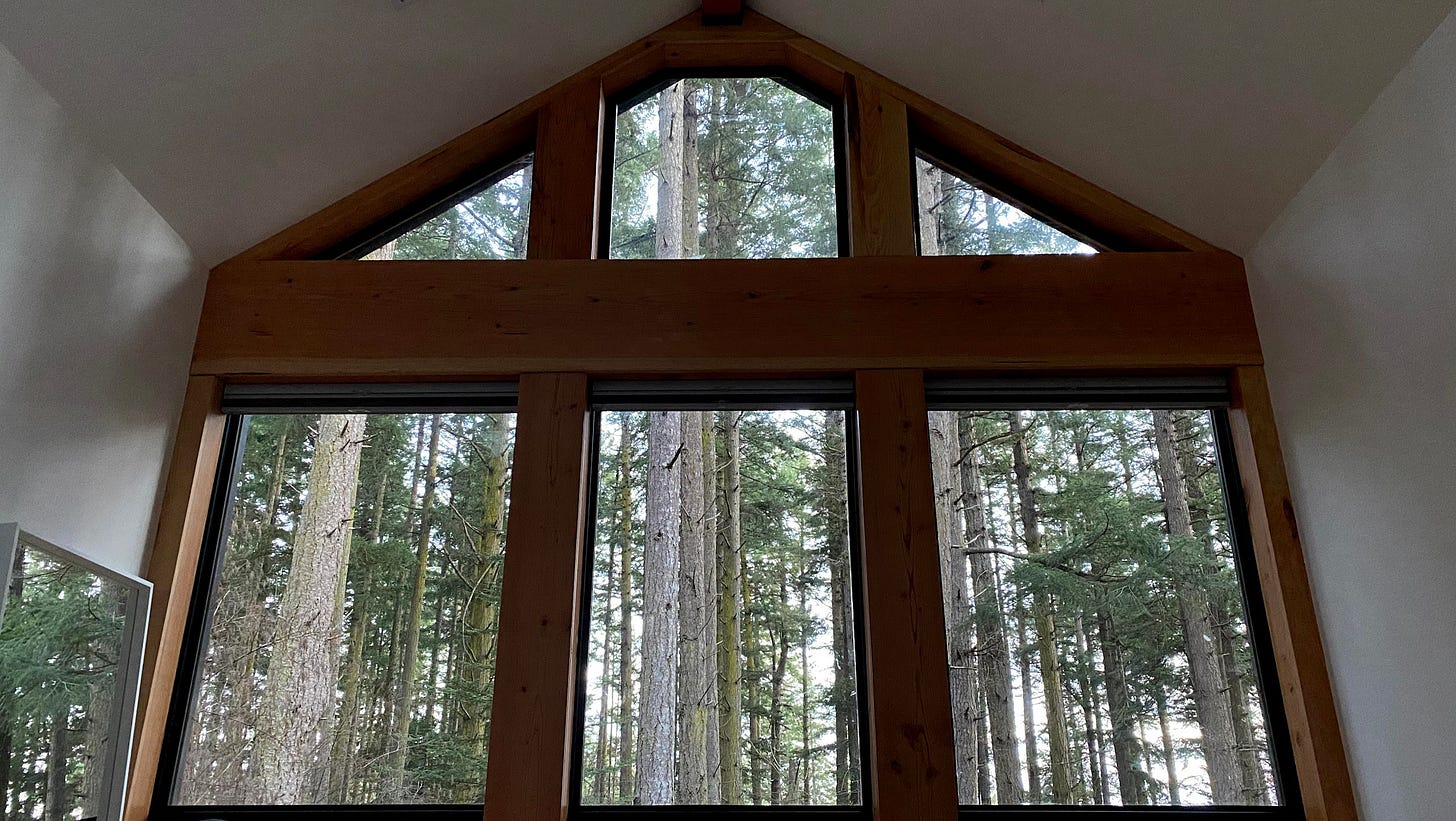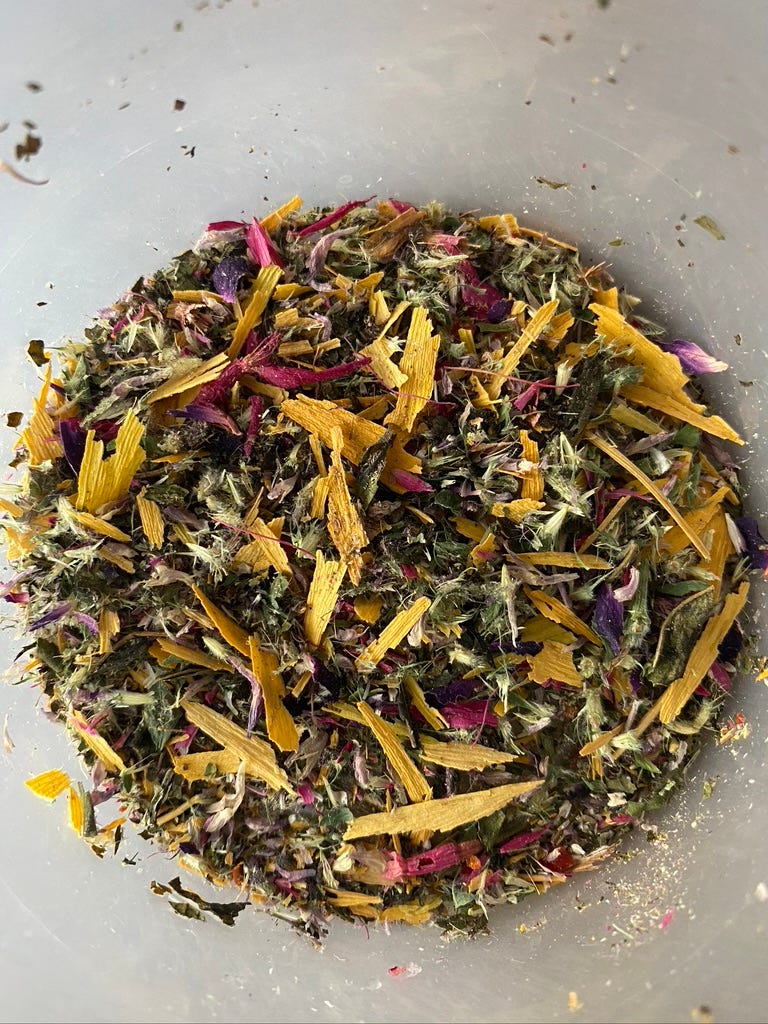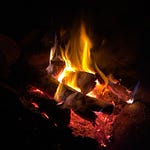In the bathroom of my apartment we have a large mirror above the sink. Perpendicular to that is another mirror, on the door of the medicine cabinet. If you swing open the door of the medicine cabinet you can start to make some fun visual effects happen.1
When the cabinet is half-open, there is still the regular reflection in each mirror, but then you have a third mirrored reflection of the one being mirrored in the other. This is all to say that since moving in here earlier this year I have spent an inordinate amount of time looking at my own face and body from angles not historically available to me.
What’s strange about all of this is that despite never having spent more time looking at myself than I do now (between the mirror tricks and the inescapable pull of my eyes toward my own face whenever I’m on Zoom, which is all the time2) I am beginning to realize how little idea I have of what I actually look like.
All the individual features of my face are clear to me, make no mistake. My eye problems are of the very regular variety and do not prevent me from seeing the shapes and colors and bumps and ridges and contours of my own head. But there’s something that prevents them from fully resolving into a clear and comprehensive picture of me that I can recall accurately at a moment’s notice. When I look straight ahead in the mirror I see a head and face and body that look, well, normal—in proportion and mostly alright, possibly even handsome. But when I catch myself in the other angled mirrors I feel like I’m looking at three separate faces, with their own features and varying degrees of aesthetic acceptability.
I don’t really know what I look like!3 In one mirror my nose appears to me almost perfectly straight and broad, and from the opposite side I clearly see a middle bump and a tip that droops and hooks. I mean, I must really be lacking some symmetry there. From straight ahead my eyes are bright, alert, vibrant. From the side mirror they appear sunken into dark hollows, opened in perpetual surprise.
Is this something you experience? Does any of this make sense? It’s a bizarre thing—I have no trouble recognizing photos of myself as myself; I am confident that in most respects my cognition trumps that of your average baby. But I am convinced when I see photos of myself from anything other than a straight on profile that they are inaccurate, having just caught me at a strange angle or in a weird movement or whatever. I never feel this way about other people, who all just look like themselves to me in their photos. Which makes me sort of worry that I go around looking like this much less symmetrical and proportional version of myself all the time, because no one else I look at outwardly appears to have this disconnect between the real self and the image self.
Our picture of the world and our place in it is constantly changing, or should be, if we’re making room to learn and grow. And I think it might be easier to come to terms with these shifts when they happen internally, rather than externally, projected onto the faces and bodies we have. I find proof of concept here in the new hobbies I’ve poured myself into during the COVID era—foraging, climbing, playing guitar, and baking pies.
When you get excited to try a new thing, it’s natural to become almost immediately frustrated, because if you’ve only ever watched the experts, you can get tricked into the assumption of simplicity. So before I started any of these pursuits, they all existed in my head in a space of abstract, impossible contradiction: simultaneously seeming very easy, when I examined the end products of others who did those things well, and almost exhaustingly difficult, when I thought about the possibility of myself ever learning to do them.
There are plenty of adages for this sort of lesson. (There always are, aren’t there?) Like Easy reading is hard writing. Or what plumbers or mechanics or IT pros might say to miserly clients:
There’s a fitting saying for the receiving end of this wisdom, too: I didn’t know what I didn’t know.
Now I do climb, and play guitar, and forage for things to ingest, and bake pies. And something I’ve learned in doing each of those is that each of them is actually very difficult to do above an amateurish level. But it has taken me getting a tiny bit good at each of them to really understand that. Before I ever picked up a guitar, I would watch Instagram videos of Jason Isbell messing around with his, and while I was extremely impressed by it, it didn’t stun me, because in my head…well, that was just playing guitar, which some people can do and others cannot. Now I play a little guitar and I understand that Jesus Christ, that dude can really play, even compared to other professional musicians.
The same goes for climbing. Before I ever got into a bouldering gym, climbing existed abstractly to me as something people either did or didn’t do, and maybe there was some variation in skill level between climbers, but really they were all just getting up and down the same walls. Now I boulder a little bit, and I know just enough about how to do it to recognize the instances when I am in the presence of people who can really just climb the shit out of some walls, not just with brute strength and fearlessness but with technique and artistry.
Foraging has been an extremely important piece of my life for the last two years, and while I don’t fully understand my compulsion to go out and harvest things to eat, I feel like I don’t need to—I’m just doing my best to lean into it. You can see where this is going. I am proud of the little that I know, but it is only because it has taken me this long to learn it that I can appreciate just how staggeringly impressive it is that there are people out there walking around who can pretty much identify, in English and in Latin, just about any old plant you’d care to point out to them, and would also know whether or not you can eat it, and more specifically which parts of it you can or can’t eat, and how to prepare it so that it’s not just edible but enjoyable, and so on. And don’t even get me started on mushrooms. That’s a whole alien world I’m happy to appreciate from the sidelines.
I’ll save you a whole sermon about baking pies. Safe to say I’ve reached the same conclusions.
I will inhabit this body—inside and out—for the rest of my life. And I am learning not just to get used to the idea, but to get excited by it. By the idea that I get to spend the rest of my days figuring out what to do with this collection of parts that were given to me. It is thrilling to think that by the time I’m really unrecognizable compared to my current self, I might be a competent musician or baker or forager, might have concrete skills and talents that I can teach to others or use to make us both happy. It is less thrilling to think of the other possibility, that I might be none of those things at the end of the road, that two or five or ten years from now I will have given up on all of them completely. But I have to hope that if that’s the case, it’s because I’ve found something that makes me even happier to spend my time doing. A true face, one I can remember and recognize from any angle.
Thanks, as always, for reading. I’ll talk to you next week.
-Chuck
PS - If you liked what you read here, why not subscribe and get this newsletter delivered to your inbox each week? It’s free and always will be.
With the mirrors themselves, not by using the stuff in the medicine cabinet. To clarify.
I wonder if all the Zoom time has actually heightened this misperception of my own face, because when I can see myself in real time on the camera I find that I am constantly modulating everything from the angle of my cocked head to the placement of my hair behind my ears to the width of my smile, all to maintain a facade of “normalcy.” Which is of course belied by the fact that I am never in that “normal” state without actively trying to be.
Or even really what I sound like, although I think that’s a much more common phenomenon. Even as I record this, I know when I listen back to it I will sound more like a second cousin or something than the voice I hear as my own when I speak aloud in real time.















